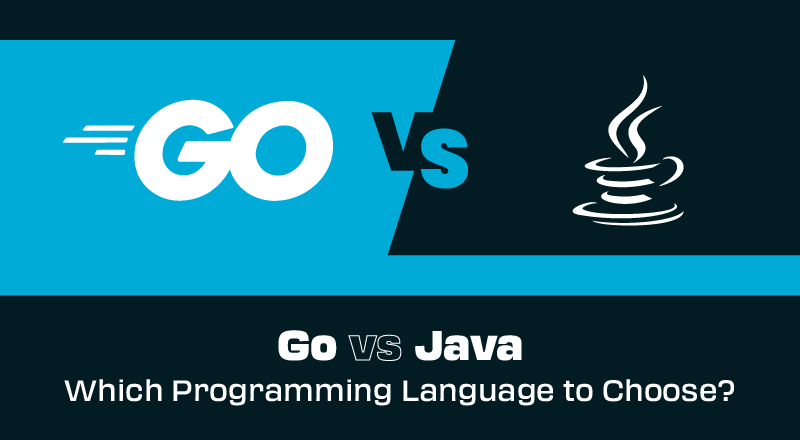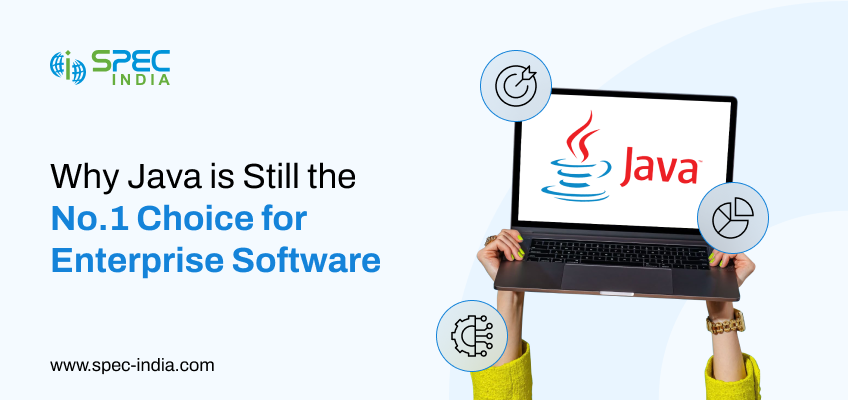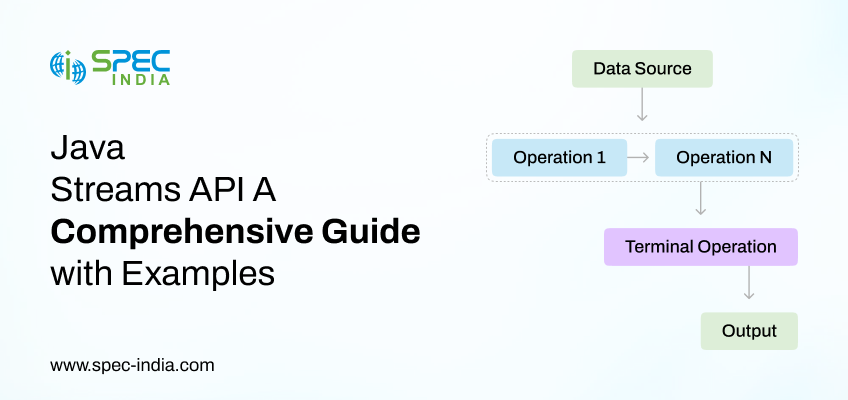Go vs Java: Which Programming Language to Choose?
Creating and implementing competitive software applications is most important for a successful business today. Hence, choosing the right programming language matters the most. The two most popular languages that are often compared are Go vs Java. Golang and Java are well-known languages that have certain similarities and differences, but both have their own strong holding in the programming industry.
Both these languages are used to create robust mobile, web, and server applications. As we compare Java vs Golang, we see that Java software development has been well-established for years, and working with Go is comparatively newer. Java is known for its code reusability and flexibility while Golang is known for its simplicity and low learning curve. Organizations must analyze what they need for their business and finalize the choice.
This article focuses on understanding these languages with their pros and cons, key features, companies using them, similarities, and key differences to assist in taking a final call.

What is Java?
Java is a programming language and computing platform first released by Sun Microsystems in 1995. It has evolved from humble beginnings to power a large share of today’s digital world, by providing the reliable platform upon which many services and applications are built.
Java is a highly popular, statically typed, object-oriented, general-purpose programming language with a virtual machine that converts code into bytecode with runtime compilation. It caters to a wide variety of applications like web applications, desktop applications, mobile applications, Machine Learning applications, Internet applications, data science, etc. Java is versatile and can execute anywhere, and it offers the role of an interpreter and an error detector.
Developers find it a delight since there are multiple pre-built modules, codes, and attached libraries on top of it, which makes it simple to search for code that is written for a specified reason. It gives support for concurrent, generic, functional, and imperative programming. It offers an enriched user interface that is portable, secure, and versatile. It is cost-effective and ideal to develop different types of applications.
An Interesting Read: Customer Booking Portal for an Online Bike Rental
What is Golang?
Go is an open-source programming language supported by Google with which you can build simple, secure, scalable systems. It is easy to learn and great for teams. There is inbuilt concurrency, a robust standard library, and a large ecosystem of partners, communities, and tools.
Go, also known as Golang, is a new, compiled, and procedural language that has static typing. This facilitates developers to create testable, lightweight code with ease. It offers concurrency control, native binaries, fast compilation, and garbage collection due to which developers find it attractive to work with. Debugging Go code is easier with inbuilt testing and benchmarking features. It is easy to create large applications with Golang.
Being a server-side programming language, Go has a similar syntax as C since it belongs to the C-family. There are goroutines, standard libraries, and robust security features that lessen complications attached to the codebase. Being a concurrent language, it is created for multicore processors, performing multiple tasks at a time. With its static typing feature, developers can easily maintain and test lightweight code in a quick manner. Go code can be reviewed and debugged quickly with its inbuilt benchmarking and testing features.
Go vs Java: Pros and Cons
Pros of Java:
- Interpreted and OOPS-oriented
- Multi-threaded support
- Platform independent
- Distributed, dynamic, and portable
- High performance
- Easy to learn, secure, and maintainable
- Garbage collection
- Vast community support
- Enriched standard library
- Code reusability with simple deployment
- Just-in-time compilation
An Interesting Case Study: Artisans Collaboration Platform
Cons of Java:
- Outdated user interface
- Tad complicated code to read
- Slower execution speed
Pros of Go:
- Statically typed and readable code
- Platform independence
- Package management
- Robust standardized library
- Easy to learn and fast to execute
- Goroutines for concurrency control
- Quick compilation even with heavy data
- Large and active community support
- Backward compatibility
- Supports multiple tools for increased efficiency
- Garbage collection
Cons of Go:
- Does not support generic functions
- Not as popular as Java
- Lesser frameworks and libraries
Java vs Go: Companies Using Them
Organizations Using Java:
Google, Uber, Airbnb, Pinterest, Netflix, PayPal, Instagram, Amazon, Spotify, Microsoft, Snapchat, Lyft, Accenture, Slack, Bitpanda, DoorDash, Revoult, Trivago, Asana, CRED etc.
Organizations Using Go:
Uber, Google, Microsoft, Twitch, Bitly, Dailymotion, American Express, SoundCloud, Dropbox, PayPal, SendGrid, 1Password, Alibaba, Riot Games, Samsara, Docker, Netflix etc.
Java vs Golang: Similarities Between Them
Being two popular programming languages, there are certain similarities between them:
- Server-side programming languages
- Garbage collection for memory management
- Belongs to the C language family
- Simultaneous execution of program blocks, concurrency
- Cross-platform compatibility
- Standard library support
An Engaging Java Application: Online Examination Web Application (OSCE Manager)
Go vs Java: It’s All About Making the Right Choice
Even though there are so many similarities between Golang vs Java, there are important differences that must be evaluated, based on different parameters such as Java vs Golang performance, security, scalability etc., prior to selection:
| Parameters |
Java |
Golang |
| Overview |
An object-oriented language, compiled into Java Virtual Machine |
A concurrent, procedural language, compiled to native machine code |
| Go Vs Java Performance |
Makes use of a Virtual Machine layer, slow because of JVM overhead and its virtual machine architecture. |
Makes use of binary file to compile code, fast because of efficient compilation. High performance and low latency processing. |
| Use Cases |
Simulation modeling, mobile apps, application servers, web servers, big data, embedded systems, financial organizations, trading platforms, games, IoT, edge devices, mission-critical applications, Android-based applications, software and mobile applications, etc. |
Cloud-based services, high-load services, backend development, Real-time communication, bot programming, network utilities, container orchestration tools, web servers, APIs, database servers, Microservices, server-side development, distributed services, Machine Learning apps, etc. |
| Tools That Can Be Integrated |
Jenkins, Junit, Site24x7, Mockito, Apache Maven, NetBeans, ManageEngine, Ehcache, VisualVM, Oracle JDeveloper, etc. |
GoLand, LiteIDE, Visual Studio Code, GoAudio, bot, authboss, goth, 1build, cosmos-sdk, acmd, CDS, aconfig etc. |
| Memory |
Intense on memory utilization, presence of a traditional garbage collector managing memory |
Light on memory utilization has pointers and no links for garbage collection |
| Ease of Learning Code |
A little complex to learn to code in Java |
Easy and simple to learn to code in Go |
| Community Support |
Deep-rooted, experienced community support |
Knowledgeable and expanding community support |
| Syntax |
Verbose syntax with object-oriented features, more punctuation marks, and keywords, appropriate classes, and objects |
Readable and simple syntax, with fewer punctuation marks and keywords. Easy for users, with no classes and objects. |
| Concurrency |
Concurrency with threads, synchronized blocks, Java commands |
Inbuilt support for concurrency with Goroutines, Channels, and other routines |
| Tooling/Libraries |
Large variety of libraries and tooling |
Fewer variety of libraries and tooling |
| Deployment |
Needs JVM for deployment |
Deploys with compiled binaries |
| Web Development |
Access to ecosystems and libraries for developing web apps |
Extensive support for Microservices and API for creating web apps |
| Generics |
Supported |
Not supported |
| Coding Speed and Style |
Stable and familiar coding style with the object-oriented way |
Compact and easy coding style, with accurate results |
| Access to Features |
Vast feature list |
Comparatively lesser features |
| Inheritance |
Supported |
Not supported |
| Mobile Development |
Huge support for Android SDK and other frameworks |
Limited native support for creating mobile apps |
| Skilled Resources |
Easily available since there is a vast talent pool |
Increasing day by day but relatively lesser |
| Security |
Security manager, no pointers |
Checksum database |
| Channel |
Supported |
Not supported |
| Classes |
Supports classes with constructors and de-constructors |
Does not support classes with constructors and de-constructors |
| Implicit Type Conversion |
Supported |
Not supported |
| Function Overloading |
Supported |
Not supported |
| Threads |
Expensive threads in Java |
Less expensive threads in Go |
| Type System |
Java possesses a static type system that has no support for type inference |
Go possesses a static type system that offers support for type inference |
| Package Management |
External package management tools like Maven, Gradle, etc. |
Inbuilt package management system called ‘go modules’ |
Go vs Java: Conclusion
Talk of the two programming titans – Go vs Java and you get to know that both are good and powerful. It is the parameters like use cases, budget constraints, skilled resources, organizational scope of work, project deadlines, etc. that can help in choosing between the two.
As we compare Go language vs Java, there are certain situations when one language is preferred over the other. Here are some such scenarios:
Java is preferred when-
- Large systems are involved
- You need front-end applications such as chatbots, AI apps, etc.
- You want apps to execute on all modern-day browsers
- You need to develop industry-based applications
- There is a need for enterprise-level applications like ERP, CRM, etc.
- You want to create web and mobile apps, games, etc.
- Your project requires a huge number of libraries and complicated functionality
Go is preferred when-
- Microservices are involved
- Memory management and simplicity is needed
- There is cloud-native development
- Creation of Golang binaries for platforms is required
- There is blockchain development, data science requirement
- Your project required high level of concurrency and performance
Whichever one you choose; it is like selecting the better out of the best. What matters the most is support and guidance from an experienced IT solutions and service provider.
As a leading Java development company, we construct scalable, reliable, secure, and cross-platform web and mobile applications for varied domains and enterprises leveraging Java’s modern competencies and suitability.
Our knowledgeable Java developers can create full-stack, all-inclusive Java-based solutions including complex, multi-layer web applications, custom product development, integration with third-party tools for high performance, legacy app migration, product reengineering, and monitoring, and customization of existing applications.
You can hire Java developers from SPEC INDIA, to build comprehensive, and scalable Java solutions that meet ever-changing business wants and prepare your business for the future. Our Java developers are well-versed in handling top ORM frameworks like Spring, Struts, and Hibernate and have a strong insight into Core Java, Advanced Java, and J2EE.
Associate with us for any kind of Java-based requirements and our taskforce will offer you the best of solutions and services.
SPEC INDIA is your trusted partner for AI-driven software solutions, with proven expertise in digital transformation and innovative technology services. We deliver secure, reliable, and high-quality IT solutions to clients worldwide. As an ISO/IEC 27001:2022 certified company, we follow the highest standards for data security and quality. Our team applies proven project management methods, flexible engagement models, and modern infrastructure to deliver outstanding results. With skilled professionals and years of experience, we turn ideas into impactful solutions that drive business growth.






